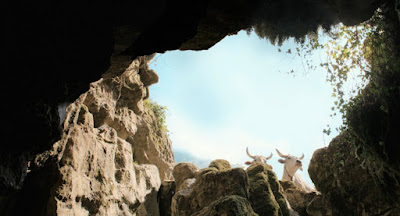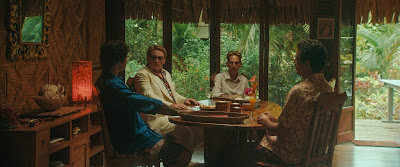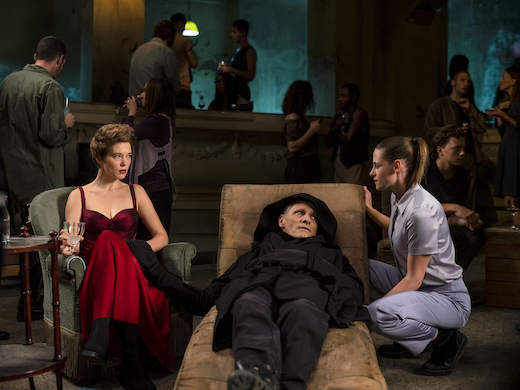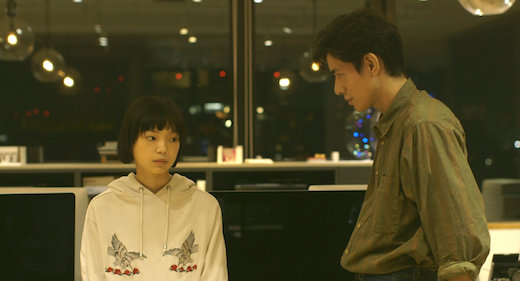Here we are again, at the end of another year. And after failing to find the time and inspiration to deliver an annotated list of the best films of 2021 twelve months ago – and after missing what feels like a larger-than-average number of "must-see" films in 2022 – the prospect of presenting my favourite movies of the year fills me with both excitement and some trepidation.
But if the recent Sight & Sound poll of the best films of all time has made one thing abundantly clear to me, it's that lists, ultimately, mainly serve one purpose: they are a resource to guide the curious to titles they might not have seen yet and might do well to catch up on. Thus, if my 2022 list – my 15th cinematic year in review if my calculations are correct – can achieve that, then it is of limited import that my year-end catch-up project fell short by some ten films.
As for which films are eligible to be listed here, my method remains unchanged from previous years: my pool of candidates consists of all the titles that premiered in the German-speaking part of Switzerland between 1 January and 31 December 2022, be that theatrically (not including festivals), on VOD, in television broadcast, or on physical media. As per usual, I will open the list with a handful of honourable mentions that narrowly missed out on top billing, ranked alphabetically, before moving on to the top ten. Here's to celebrating the best of 2022 and to looking ahead to many more great films in 2023.
Honourable Mentions
 |
| © Xenix Filmdistribution GmbH |
Il buco
directed by Michelangelo Frammartino
(Italy/Germany/France, 2021)
directed by Michelangelo Frammartino
(Italy/Germany/France, 2021)
In a year that was blessed with an exceptionally strong showing from the slow cinema cohort, Il buco was perhaps the most visually stunning of them all. Told in Italian writer-director Michaelangelo Frammartino's typically implicit, effectively dialogue-free style, this contemplative, gorgeously understated tribute to a groundbreaking speleological expedition in 1960s Calabria explores, against the backdrop of Italy's post-war boom, the connection between the people and the land they live on. "Every frame's a painting" may have become a tired cliché, but in Il buco's case it feels more than appropriate, with Frammartino reminding us of the cumulative power of a series of impeccably composed, lyrically expressive shots. Il buco is available on Filmingo and on DVD and Blu-ray.
 |
| © Ascot Elite Entertainment Group. All Rights Reserved. |
Little Nicholas: Happy as Can Be
directed by Amandine Fredon and Benjamin Massoubre
(Le Petit Nicholas: Qu'est-ce qu'on attend pour être heureux?, France/Luxembourg/Canada, 2022)
directed by Amandine Fredon and Benjamin Massoubre
(Le Petit Nicholas: Qu'est-ce qu'on attend pour être heureux?, France/Luxembourg/Canada, 2022)
In a year filled with high-profile animated movies, it was Amandine Fredon and Benjamin Massoubre's adaptation/history of beloved French children's book character Little Nicholas ("Le Petit Nicolas") that stood out – both for its delectable hand-drawn animation and its canny incorporation of the character's creators, writer René Goscinny and illustrator Jean-Jacques Sempé, into the fabric of the film. Little Nicholas: Happy as Can Be could probably have succeeded creatively and financially by simply basking in the easy 1950s nostalgia of its source material – but by situating the titular schoolboy in a playfully explored historical context, Fredon and Massoubre make an excellent case for his continued relevance. Little Nicholas: Happy as Can Be is currently playing in Swiss cinemas.
 |
| © Filmbringer |
My Old Man
directed by Steven Vit
(Für immer Sonntag, Switzerland, 2022)
directed by Steven Vit
(Für immer Sonntag, Switzerland, 2022)
In the era of film schools, documentary feature debuts about family members are a dime a dozen. So it's all the more remarkable when one of them manages to mine the well-worn format for more than cheap sentimentality: in My Old Man, Steven Vit accompanies his father on his journey into retirement – and ends up with a lovingly specific, subtly incisive portrait of a one-company man whose career trajectory is now little more than a fondly remembered artifact of the 20th century, of a husband and father who has to renegotiate his relationship with his family, and of a family faced with a main breadwinner who is suddenly out of a prescribed social role. It's unspectacular, but it cuts deeper than it lets on. My Old Man is available on Vimeo. (Read my full reviews on Maximum Cinema and Cinema-Jahrbuch.)
 |
| © Lars Olav Dybvig and Motlys / © Xenix Filmdistribution GmbH |
Ninjababy
directed by Yngvild Sve Flikke
(Norway, 2021)
directed by Yngvild Sve Flikke
(Norway, 2021)
To call Yngvild Sve Flikke's outrageously funny adaptation of an Inga H Sætre graphic novel Norway's answer to Juno would be simplifying things a little too much – but suffice to say that Ninjababy need not be daunted by the comparison: the story of 23-year-old Rakel (Kristine Kujath Thorp), who only finds out she's pregnant six months into the process, is an unapologetically foul-mouthed, deeply empathetic tragicomedy that takes seriously the notion that for some people, having children is not just "not for them right now" but actually "not for them ever. Ninjababy is available on Filmingo and will be released on DVD in early 2023.
 |
| © Sister Distribution |
Pacifiction
directed by Albert Serra
(France/Spain/Portugal/Germany, 2022)
directed by Albert Serra
(France/Spain/Portugal/Germany, 2022)
With Pacifiction, The Death of Louis XIV writer-director Albert Serra delivers another slow-burn satire about the sheer absurdity that is political theatre. The brilliant Benoît Magimel stars as a high-ranking government official in the French overseas territory of Polynesia, holding hilariously interminable meetings about a rumour that the French military may be looking to resume its nuclear tests in its Pacific dependencies. It's the inner workings of modern-day colonialism, seen through the eyes of a boisterous but ultimately hapless middleman – all beautiful island vistas and impenetrably codified human depravity. It's not the easiest cinema experience imaginable, but Serra's penchant for puncturing the shiny surfaces of power with his slyly caustic wit makes sure that Pacifiction is one of 2022's most haunting films. Pacifiction is currently playing in Swiss cinemas. (Read my full review.)
The Top Ten
 |
| © Maurice & Katia Krafft |
10
The Fire Within: Requiem for Katia and Maurice Krafft
directed by Werner Herzog
(France/United Kingdom/Switzerland, 2022)
The Fire Within: Requiem for Katia and Maurice Krafft
directed by Werner Herzog
(France/United Kingdom/Switzerland, 2022)
Cinematically, 2022 was a bumper year for those interested in delving into the life and work of French volcanologist couple Katia and Maurice Krafft, who, after more than 20 years of globetrotting research, died in 1991 when they were caught in a pyroclastic flow at the base of Japanese volcano Mount Unzen: first, there was Sara Dosa's Fire of Love, an extremely entertaining biographical documentary that hammers home – perhaps a little too insistently – the beauty of two lovers sharing their fiery passion and unusual vocation. And then there was The Fire Within: Requiem for Katia and Maurice Krafft, veteran Bavarian director Werner Herzog's intimately personal celebration of the couple as adventurer-filmmakers in his own mould, as kindred spirits whom he admires, relates to, and who have inspired him for the last half-century. Indeed, Herzog, who has previously featured the Kraffts in 2016's Into the Inferno, is largely unconcerned with their work as scientists, or their biographies apart from the volcanic episodes they put to film. Instead, he movingly eulogises them as trailblazing imagemakers, whose unique view of sublime natural beauty and the sheer diversity of the humanity living in said sublimity's shadow continues to help us peek beyond the surface of our planet's very creation. The Fire Within is, in effect, an annotated highlight reel – which means Fire of Love, with its more traditionally structured approach, complements Herzog's awestruck journey through the Kraffts' archive rather well – but one that sheds light not just on its subjects' creative process and way of relating to the world they loved; but also on Herzog himself, who, at 80, seems to be starting to pre-emptively curate his legacy by wrestling with the work of those he considers his spiritual teachers. The Fire Within: Requiem for Katia and Maurice Krafft is currently available neither for streaming nor on physical media.
 |
| © Seeland Filmproduktion / ©Filmcoopi Zürich AG |
9
Unrest
directed by Cyril Schäublin
(Unrueh, Switzerland, 2022)
Unrest
directed by Cyril Schäublin
(Unrueh, Switzerland, 2022)
After announcing himself as a talent to watch with his quietly apocalyptic 2017 debut feature Those Who Are Fine, Cyril Schäublin went a step further this year, delivering a film that immediately puts him in the running for the title of best Swiss-German filmmaker currently working. Unrest, which is set in a watch factory town in 1870s Switzerland, doubles down on Schäublin's unconventional approach to visual storytelling – favouring anonymising wide shots and close-ups over more traditionally character-centric framing – but turns it on its head tonally and thematically: while Those Who Are Fine used these stylistic devices to illustrate the soul-deadening alienation of late capitalism, Unrest deploys them as an attempt to push back against the notion of singular historical protagonists. The pioneering Russian anarchist Pyotr Kropotkin (played by Alexei Evstratov), around whose historically documented trip to the watchmaking villages of the Swiss Jura Mountains the film is built, may enjoy top billing – but Schäublin's narrative emphasis lies squarely on the anarchist collective Kropotkin finds operating within the capitalist factory structures, and its principled resistance against the forces of industry and the state, which, in the 1870s, are in the process of colluding against the international labour movement. It's a clear-eyed portrait of the forces that led to the establishment of capitalism as economic dogma in large parts of the Western world, but Unrest, with its playful sense of humour and sincere belief in a better world, refuses to tell this story as one of doom and gloom: just like there was a time before standardised time zones, there was a time before capitalism; and ultimately, Schäublin seems to suggest, these are all just human-made constructs anyway – constructs that might just as well be unmade. Unrest is currently playing in Swiss cinemas. (Read my full review.)
 |
| © Frenetic Films AG |
8
Happening
directed by Audrey Diwan
(L'événement, France, 2021)
Happening
directed by Audrey Diwan
(L'événement, France, 2021)
Adapted from the eponymous autobiographical novel by 2022 Nobel Prize winner Annie Ernaux about a young woman's struggle to get an illegal abortion in 1960s France, Happening, the third directing effort from French director Audrey Diwan (which premiered in 2021), could not be a more timely film. Forgoing the ostensive period markers that dominated 2022's similarly themed – and significantly more middling – Call Jane, Happening frames her student protagonist's Odyssean quest, complete with trials, sirens, and a metaphorical journey to the underworld, as a timeless injustice, as a particularly insidious strategy of subjecting women and their sexuality to patriarchal control that comes in especially handy at times of large-scale feminist movement. While this premise would lend itself to actors seeking to engage in overwrought histrionics, lead actor Anamaria Vartolomei, who serves as the perennially in-focus anchor point of Laurent Tangy's claustrophobically intimate cinematography, excels at the opposite, letting her character's exasperated anger and quiet desperation simmer beneath an at times fascinatingly unreadable face. In that, Vartolomei's fantastic performance is much like the film that surrounds her: with Happening, Diwan delivers not a cry of anguish but a paean to determined persistence as an agent of resistance and eventually, one can only hope, change and liberation. Happening is available on blue TV, Kino on Demand, Apple TV, Sky, DVD, and Blu-ray.
 |
| © 2021 Focus Features, LLC / © 2022 Universal Studios. All Rights Reserved. |
7
The Northman
directed by Robert Eggers
(United States, 2022)
The Northman
directed by Robert Eggers
(United States, 2022)
Given the current state of franchise-driven cinema economics, there probably was never a scenario where The Northman, Robert Eggers' hyperviolent 70-to-90-million-dollar adaptation of the Norse legend that inspired William Shakespeare's Hamlet, would be a box-office success story. And indeed, the fact that Eggers' third feature failed to break even with even the most conservative budget estimates will probably mean that The Northman will remain his most expensive movie for at least a while. For shame, because to see Eggers' lovingly crafted, obsessively specific visions of the distant past play out on as big a scale as this one is a stark reminder of the power inherent in this kind of historical cinema. As in The Witch (2015) and The Lighthouse (2019), the allure of Eggers' approach to history lies not primarily in the astonishing detail of his period production values here – though it is deeply impressive, especially in conjunction with Eggers' qualities as an director of bloody sword-and-shield action – but in the dedication to let the story of orphaned Prince Amleth (Alexander Skarsgård) and his quest for revenge play out in accordance with the source material's early-medieval sensibilities. The Northman does not depict the past from a place of modern-day condescension but seeks to take seriously, understand, and, in the process, critically interrogate the ideas that governed it: fate, patrilineal legacy, and "honourable" death are treated as genuinely held beliefs that are worth engaging with – even as Eggers frames them as the seeds of all the atrocities of humanity's second millennium, from slave ships to gas chambers. As entertaining, thematically substantial, engagingly thorny historical cinema goes, The Northman has set the standard for the foreseeable future. The Northman is available on Google Play, the Microsoft Store, Apple TV, Rakuten, blue TV, Sky, DVD, and Blu-ray. (Read my full review.)
 |
| © Variance Films / © Netflix |
6
RRR
directed by S. S. Rajamouli
(India, 2022)
RRR
directed by S. S. Rajamouli
(India, 2022)
In a year that also included Top Gun: Maverick and Avatar: The Way of Water – two more than worthy outings in their own right – it is RRR that walks away with the title of best action movie. In truth, S. S. Rajamouli's Telugu epic, which details the unlikely (and entirely fictional) team effort of two historical heroes of India's struggle for independence, stands tall as probably the finest piece of maximalist action filmmaking since George Miller's Mad Max: Fury Road (2015). Over the course of three exuberantly bombastic hours, Rajamouli and his two lead actors, Tollywood megastars Ram Charan and N. T. Rama Rao Jr., unleash fire, fury, and wildlife on British colonial power, delivering one heart-stopping choreography – both of the musical and the violent kind – after another. Not only does RRR throw into stark relief the regrettable lack of emotional sincerity and imaginative spectacle in much of contemporary American blockbuster genre cinema; it also works as an invitation to the curious to look beyond the established definitions and clichés governing cinematic tastes and viewing habits – to finally collapse the arbitrary boundary that has been drawn between "world cinema" and "mainstream appeal." The Hindi version of RRR is available on Netflix. (Read my full review.)
 |
| © 2022 Universal Studios. All Rights Reserved. |
5
Nope
directed by Jordan Peele
(United States, 2022)
Nope
directed by Jordan Peele
(United States, 2022)
The effort to champion emerging filmmaking talents means having to resist the temptation to give in to overhyping, as the weight of expectation that is placed on each subsequent project risks being a creatively stifling influence – and to invite vicious backlash against said talent's credentials at the first sign of imperfection. However, Jordan Peele's career makes it difficult to adhere to those principles: after bursting onto the scene with the satirical horror allegory Get Out in 2017 and underscoring his knack for narratively and thematically potent genre cinema in 2019's Us, the comedian-turned-writer-director proved again this year that he is a cinematic force to be reckoned with. Paying homage to the history of science-fiction, Nope tells the story of a Black Hollywood horse rancher (Daniel Kaluuya) and his sister (Keke Palmer) trying to capture footage of a UFO that seems to be stalking the skies above their property. Compared to Get Out and Us, this film finds Peele in the mood for even more ambitious metaphorical swings and markedly grander visuals – with Hoyte van Hoytema's sweeping desert cinematography being more than up to the challenge – and, as a result, ends up as perhaps his most impressive achievement to date, managing to reflect on more than a century's worth of toxic spectacle culture and movie-related exploitation whilst also delivering a supremely entertaining summer blockbuster truly deserving of the name. Nope is available on UPC TV, blue TV, Google Play, the Microsoft Store, Rakuten, Apple TV, Sky, DVD, and Blu-ray. (Read my full review.)
 |
| © Nikos Nikolopoulos / © MMXX. NEON Rated, LLC. All rights reserved. |
4
Crimes of the Future
directed by David Cronenberg
(Canada/France/United Kingdom/Greece, 2022)
Crimes of the Future
directed by David Cronenberg
(Canada/France/United Kingdom/Greece, 2022)
What a joy, to discover that an old master has not lost their touch. Eight years out from his last directing effort, 2014's Maps to the Stars, and almost a quarter-century after his last foray into body horror, David Cronenberg, the Canadian master of the artistically grotesque, is back with Crimes of the Future – an unapologetically heady, wickedly funny piece of art theory featuring a wide range of typically Cronenbergian indulgences, from plastic-eating children to erotically charged acts of vivisection. Set in a dystopian future where pain has been eradicated, where certain segments of the population have evolved to grow new organs at an alarming rate, and where some people are using these developments to transcend the limits of what is considered art, Crimes of the Future is confidently – and beguilingly – uninterested in ingratiating itself with its audience, happy to broadcast its own strangely contented apocalyptic vision to anyone willing to engage. "Body Is Reality," the film states in a central scene – but that reality, as evidenced by the brilliantly stylised performances from Viggo Mortensen, Léa Seydoux, and the hilariously off-kilter Kristen Stewart, does not have to be natural, or even recognisably human: whatever humanity touches loses its natural aura and becomes, in one, way, shape, or form, synthetic. The thought is horrific – but laden with artistic potential. Crimes of the Future is available on DVD and Blu-ray.
 |
| © Sister Distribution |
3
Wheel of Fortune and Fantasy
directed by Ryūsuke Hamaguchi
(偶然と想像, Gūzen to Sōzō, Japan, 2021)
Wheel of Fortune and Fantasy
directed by Ryūsuke Hamaguchi
(偶然と想像, Gūzen to Sōzō, Japan, 2021)
The second of two 2021 Ryūsuke Hamaguchi dramas to open in Swiss cinemas this year, Wheel of Fortune and Fantasy is a characteristically tender offering from the Japanese master of the wordy, relationship-driven character study. Unfolding over the course of three separate short films – entitled Magic (or Something Less Assuring), Door Wide Open, and Once Again, respectively ¬– the film explores unlikely coincidences and how people choose to react to having been thrust into the role of fate's plaything: a friend's new boyfriend turns out to be one's own former lover; a petty revenge plot goes awry; two people think they recognise each other from way back when. Hamaguchi, with the help of an economical visual concept and a stellar ensemble cast featuring Kotone Furukawa, Hyunri, Ayumu Nakajima, Katsuki Mori, Shouma Kai, Kiyohiko Shibukawa, Fusako Urabe, and Aoba Kawai, invariably mines these rough narrative sketches for moving emotional insight and devastating character detail, cementing himself as perhaps contemporary cinema's finest craftsman of slice-of-life drama. Wheel of Fortune and Fantasy is available on Filmingo. (Read my full review.)
 |
| © Kick the Machine Films, Burning, Anna Sanders Films, Match Factory Productions, ZDF-Arte and Piano, 2021 / © Cinémathèque suisse |
2
Memoria
directed by Apichatpong Weerasethakul
(Thailand/Colombia/United Kingdom/France/Germany/Mexico/China/Taiwan/United States/Switzerland, 2021)
Memoria
directed by Apichatpong Weerasethakul
(Thailand/Colombia/United Kingdom/France/Germany/Mexico/China/Taiwan/United States/Switzerland, 2021)
Somehow, the Earth remembers. In his first feature shot outside of his native Thailand, slow cinema master Apichatpong Weerasethakul (Tropical Malady, Uncle Boonmee Who Can Recall His Past Lives) ruminates on familiar themes, such as the metaphysical connections between people and their surroundings, but expands it to include all of terrestrial history. Starring Tilda Swinton as an expat botanist, who travels first through Bogotá, then through the Colombian countryside in search of the source of a mysterious boom only she can hear, Memoria makes palpable the only seemingly esoteric idea that humanity is of the Earth, that, on an individual level, we are but clumps of matter protruding from a living planet that is unfathomably old and will outlive us many million times over. Drawing from pantheistic mysticism and quantum mechanics in equal measure, Apichatpong posits in remarkable visual and sonic detail that human beings are, in effect, nodes in a planetary network, synapses in a vast and inscrutable terrestrial memory, lost – or safely nestled – amid the hummings, babblings, blubberings, and rustlings of a living world. Memoria is available on DVD and Blu-ray. (Read my full review.)
 |
| © Sister Distribution |
1
Drive My Car
directed by Ryūsuke Hamaguchi
(ドライブ・マイ・カー, Doraibu Mai Kā, Japan, 2021)
Drive My Car
directed by Ryūsuke Hamaguchi
(ドライブ・マイ・カー, Doraibu Mai Kā, Japan, 2021)
Many filmmakers can only dream of making a film as good as Wheel of Fortune and Fantasy. The fact that Ryūsuke Hamaguchi made both it and the even better Drive My Car in the same year seems like a strong enough case for hailing him as a true master of the contemporary cinema screen. Adapted from Haruki Murakami's short story of the same name and borrowing elements from other stories from Murakami’s 2014 collection Men without Women, Drive My Car is a three-hour exercise in profoundly moving character work, which, in keeping with the central narrative conceit – a widowed theatre director (played by an outstanding Hidetoshi Nishijima) staging a multilingual performance of Anton Chekhov's Uncle Vanya – doubles as a quietly edifying celebration of the soul-healing potential of art. Hamaguchi's touch remains light throughout, keeping even the narrative's brushes with melodrama assuredly low-key and achieving a maximum of emotional impact through the steady, unhurried, consistently compelling build-up of characters' conflicts, both amongst and within themselves. In doing so, Drive My Car also serves as a resounding endorsement of long-form cinematic storytelling, its keen eye for interpersonal detail, its confidence to let characters relitigate certain events through dialogue in order to utterly recontextualise them, and its patience in letting moments play out in all their unspectacular glory resulting in an experience that is just about as immersively engaging as movies can get. Not only does Hamaguchi's film have the distinction of being 2022's best Swiss cinema release; it is already an early favourite for the best film of the decade. Drive My Car is available on Filmingo, Kino on Demand, Rakuten, DVD and Blu-ray. (Read my full review.)


Keine Kommentare:
Kommentar veröffentlichen